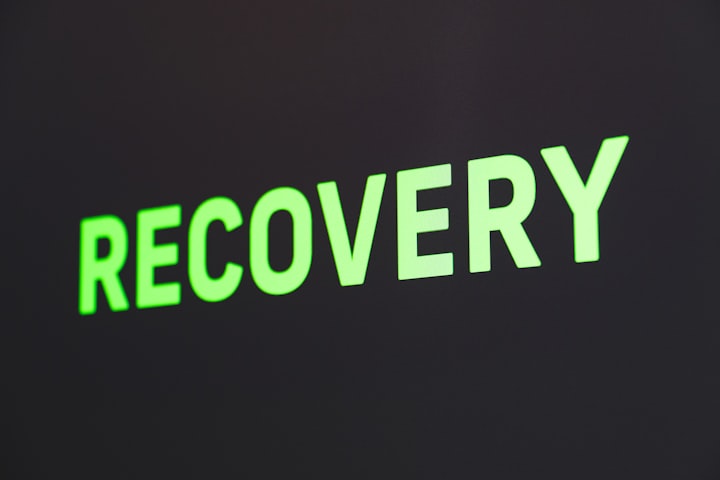
**DISCLAIMER: If you or someone you know is struggling with addictive substances, actions, or behaviors, PLEASE try and seek professional help. These tips here are by no means an exhaustive list or a cure. As someone in my own recovery journey, these are just some of the important things that I have learned along the way. Depending on the vice and severity, it may be dangerous or even deadly to try and attempt recovery on your own, without medical supervision. Be safe, Friends. You're worth your health and happiness in life**
____________________________________________________
Recovery is simple, right? All you have to do is, well, recover. You stay away from your vice of choice and you're cured! Right?
Wrong.
There's so much more to recovery than sobriety or abstinence from a particular activity or behavior. Let’s go through some of the steps, shall we?
Step 1- Understand that everyone has different needs
When first trying to recover, it's often hard to figure out where to start or what to do. There are all these different programs, places, tools… it can become a bit overwhelming to think about it, let alone choose. In some cases, it's even harder depending on what's available for your specific area of recovery, as well as physical location or even cost.
For reverence, and for options if you are looking for them, here is a small list. By no means do these encompass every option, especially if you have something catered to your specific location/needs.
In-patient rehabilitation centers
Counselling/therapy
Group therapy, including intensive outpatient (IOP) therapy
The important thing to remember here is that everyone is different. Everyone has different needs, different learning styles, different things that work for them. No one system or tool works the same for everyone. While it can be a little frustrating at times, that's okay! If you already have an idea of what types of things do or don't work with you, that can help you narrow down the options, so it's not as daunting.
This is also important to remember if you have a loved one who is trying to recover. Just because they aren't responding to a specific technique the way you did or imagine you would does not mean they are not making the effort. It could simply be that the tool they are using isn't right for them, and may need to try something else, or use it in combination with another method. No two people are the same, and therefore, no two people respond the exact same way in the same recovery program.
Step 2- It's not all about sobriety/abstinence
When you're trying to recover, it's important to remember that it's not all about the time spent without your substance/behavior of choice. What IS important is what you learn in that time, the progress you made, and importantly: living a life worth living.
Of course the ideal with problem behaviors or substances, particularly ones that are dangerous, is to partake in them as minimally as possible when in recovery. However, everyone's recovery goals are different and slip ups or relapses happen. It's okay. Not everyone is trying to quit completely. Maybe they just want to taper off, or slow down and limit their use. Maybe they have a relapse every now and then, but are generally doing much better. These, and every other thing, are all okay.
What's not okay is to demean or belittle someone if they haven't fully severed themselves from their vice, or if they've had a relapse.
This leads into point three:
Step 3- It's not all about Time
While keeping track of your Time since your last indulgence is helpful for some, it can be hard for others. In some cases, having a rough estimate of your Time can be a good thing, as some substances have a chemical reaction within your brain and can bring on sudden or worsening urges/cravings at relatively common time frames. However, this idea of Time can be really daunting for others, especially after a relapse.

When this happens, it's vital to remember that recovery isn't all about Time.
So, your goal was 6 months and you made it 3. That's still great! That's 3 months of growth, 3 months of new tools and learning. That right there is 3 months of progress, Friend. It doesn't mean that all of your work up until now is lost. You're not starting over from square one. You are a different person now than where you were 3 months ago.
One of my friends says it this way: When you're on a road trip from New York to California, and your tire goes flat, you don't go back to New York to fix it and start over. No, you use what's in your toolbox to get you back out onto the road and finish your journey. The first time, maybe you have no idea what to do, and don't have a jack or spare tire. The tool in your toolbox is to call a tow truck to come pick you up. If you have a tire and a jack, but don't know how to use them, maybe you call a family member or friend that knows how to change a tire. They can try and walk you through the process. The next time, you've already done it. You have the tools; you have the knowledge; you have the skill. So, you pull over, change that tire, and get back on the road.
Maybe the next time isn't your tire though. Maybe it's your engine. Even though the circumstances are different, you still have tools in your toolbox to use. You can call a tow, a mechanic, someone you know who can walk you through it. And as time goes on, no matter how many times you break down, you keep learning along the way.
Now, maybe you can see when something is getting close to falling apart. You can foresee it and prevent it before it happens, or even try and soften the blow so it's not as harmful when it goes out. You know what tools to keep on hand for your vehicle, and what ones just do more damage when you're stuck on the side of the road.
But, no matter how many times that car breaks down, no matter how long it takes, you can still get to California from where you're at. You don't have to go back to the starting point. You've spent this time learning and growing.
That wasn't Time wasted.
That was progress.
Step 4- Stop comparing
Just… stop comparing, okay?
Stop comparing yourself to others. Their journey is not yours. Even if you share similar backgrounds, you both live different lives and have different emotions and reactions to stimuli. You can't accurately compare your progress and recovery because no two people have the same exact story. If you compare, you're just going to make one of you look bad when you both have so much to celebrate.
Stop comparing yourself to your past. While it's good to take stock of where you started so that you can see your growth, you can run into some nasty consequences if you start comparing. Maybe your last time was a little over a year, and right now you're struggling at 6 months. Comparing here will just make you feel worse. Who's to say you weren't also struggling before, and simply don't remember it? Or maybe in the 6 months since your relapse, a lot in life has changed. Big changes, good and bad, can definitely cause struggles.
And, looking back on the previous example, your previous journey is different from your current one. You were a different person back then, going through completely different events and stages in life. These are not things you can compare and get an accurate depiction of ‘better’ or ‘worse.’ You've changed. Life has changed. Everything, well, everything has changed.
So stop comparing, and just move on to the next point.
Step 5- Acknowledge the incremental changes
Of course, we know that nothing stays the same. As such, everything must change, albeit gradually in many cases. You can spend days, weeks, months, even years thinking that everything is as it always was. You haven't made as much progress as you thought you would have. You feel stuck, and still struggle with some of the same things as you did a year or 10 years ago.
That’s okay. It doesn't mean you haven't been learning and growing this whole time. It just means you're looking at the situation from an all or nothing standpoint. Look a bit closer, and you'll start to see all the incremental changes that have to happen in order to get to that Big Picture Ending you dream of. Baby steps, if you will.

Maybe you still had a slip when you failed a test. But maybe a year ago if this had happened, you would have completely succumbed to your cravings, staying there for days or weeks, where this time was just a night and a lot lighter than you used to. Maybe you were still very upset about it and wanted to give in, but you called a friend and asked what to do. Then, maybe next time, you'll use the tools in your toolbox to get you through, and maybe 2 years from now you'll have an action plan in place to keep you sailing smoothly no matter what waves come crashing down.
Incremental change is still change. Some progress is still progress.
Rome wasn't built in a day. Your recovery won't be completed in a day either. You didn't learn these patterns and behaviors overnight, and they're not going to change overnight either. It takes time. It takes experience. It takes growth, and it takes baby steps.
Think of it like going to the gym and working out. Maybe your end goal is to lose 50lbs (roughly 22.7kg). Maybe after a year, you've only lost half of the weight you set out to lose. Does that mean you've failed? Does that mean you haven't made any progress? Well, let's look at the little details.
When you first started out, you got winded just using the treadmill or using the elliptical on a lighter setting. But, after a few weeks, that became a bit easier. You didn't get so out of breath, and could endure the same resistance for longer periods of time.
However, as you increased the resistance or inclination over time, it became hard again. You were just as out of breath as you were when you started! Does this mean you haven't made any progress?
NO. It simply means the progress you made got you to this point. Before now, you wouldn't have been able to do this at all, let alone at this setting. This is an incremental change, another step closer to your goal.
As you did this, you began building muscle. Maybe you didn't have a lot of muscle before you started, so the pounds seemed to melt away at first… until the muscle began to form. Since muscle weighs more than fat, you sort of plateaued or even gained a little back. You kept eating healthier, increasing your exercises and intensity, but the weight just didn't seem to budge. Does this mean you failed? Maybe you didn't try hard enough or weren't cut out for it?
NO. It simply means you have to look at the impacts from other angles. Maybe the number on the scale didn't seem to change, but your clothes became looser and you even ended up needing to wear a belt or buy new outfits. Maybe your arms and legs are more toned, and you can lift or run more than you ever could before.
These are all incremental changes that get you another step closer to your goal. These are just as important as the big accomplishments, since you wouldn't get those winners without these rungs of support under your feet.
And these are just as important in recovery as they are in every aspect of your life.
Step 6- Know that you're not alone

This is one of the other big ones. When things get tough and you're staring down the bottle at a relapse or breakdown, it can be hard to feel like anyone else possibly understands where you're at. And, yes, no one has been in your exact situation. No one can know exactly what you're thinking or feeling but you. However, there are still people who can relate and empathize.
These people can be others in your recovery groups, like a sponsor, facilitator, group member, or professional, or they can be friends and family- even those who have never gone through a recovery process.
In these moments, it's vital to open up and talk to someone. If it's someone who has a similar vice or mindset as you, or have gone through experiences that easily relate, you'll probably get a lot of personally catered advice or understanding. When speaking to family and friends who haven't been there, they can still be just as supportive, even if they don't understand exactly how you're feeling. Sometimes, just having that conversation, connection, and release of energy can be a big help in getting through a troubling moment or series of events.
No matter the situation, there will always be someone out there that you can talk to.
You are never alone in this fight for your life.
You can do this.

___________________________________________________
*If you enjoyed or learned something important from this story, drop a like or share it with someone who may need to hear some of these things.
If you like, share, or donate, thank you so much! It is greatly appreciated and helps me keep improving.*
About the Creator
J. Lee
French enthusiast, non-binary trans person, artist, writer, lover of animals, space, and the right for every living thing to experience their existence authentically.
Pronouns: they/them (English) iel (French)






Comments
There are no comments for this story
Be the first to respond and start the conversation.